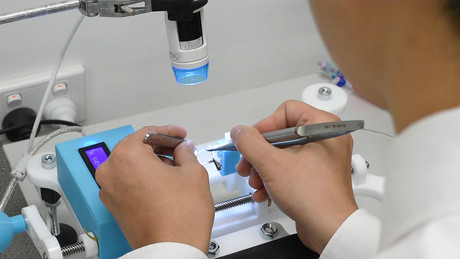New additive biomanufacturing centre launched

The Australian Research Council has launched a new training centre focused on developing next-generation biomanufacturing technologies.
Directed by Queensland University of Technology (QUT) Distinguished Professor Dietmar W Hutmacher, the ARC Industrial Transformation Training Centre in Additive Biomanufacturing is a collaboration by five Australian universities, the Shanghai Institute of Ceramics, St Vincent Hospital in Melbourne and medical industry partners.
“Just some of the transformational advanced materials the Training Centre has already been working on include building a 3D printer for bioinks that can be used for regenerative medicine and creating custom-tailored replacement bone implants. They are also leading advances in robotic surgery,” said Australian Research Council (ARC) CEO Professor Sue Thomas.
Queensland University of Technology is receiving $3.7 million over four years under the ARC Industrial Transformation Training Centres scheme.
“An important part of ARC Industrial Transformation Training Centres is the opportunity they provide to early-career researchers, to gain an experience in an industry setting, within a highly driven research environment. This training centre will train up future research leaders by providing opportunities to Higher Degree by Research and postdoctoral students.”
Three research projects well underway at the centre based at QUT’s Institute of Health and Biomedical Innovation are:
- A handheld ‘bio pen’ fed with bioink that will allow surgeons to 3D print patient-specific cartilage cells on to knee and hip joints to repair and replace cartilage, which is the ‘shock absorber’ for our long bones.
- A 3D-printed device that lets surgeons practise suturing tiny 3D-printed ‘blood vessels, nerves, ligaments and tendons’ to increase their skill and speed and test the quality of suturing lines via measuring the burst strength and water leakage.
- Cell biology and tissue engineering scientists are moving ever closer to personalised, patient-specific cancer therapy by using 3D-printed hydrogels to model individual patients’ tumours to test for the most effective drug for that particular patient.
“The centre is focused on developing the next generation of additive biomanufacturing technology and training the future leaders of this field,” Professor Hutmacher said.
“Each of the centre’s 12 PhD candidates and three postdoctoral researchers is working with an industry partner and an academic expert in the field so that we can bring these findings from ‘bench to bedside’ quickly.
“Our research team includes biomedical engineers, biochemists, surgeons and a lawyer working on every aspect of this game-changing field of medicine so it becomes part of everyday medical practice in the near future.
“Other areas where our research has already broken new ground include: design and manufacture of 3D printers based on the concept of melt electrospinning writing (MEW) to enable printing at a finer scale than previously achieved — down to 0.01 mm — which can be precisely tailored for a variety of biomedical applications such as heart valves, blood vessels, nerve guides and bone scaffolds; spin-off company (Gelomics) which develops and manufactures advanced bioinks that allow 3D-printed cells and fabrication of 3D models for cancer research.”
QUT Vice-Chancellor Professor Margaret Sheil AO said the centre was at the cutting edge of how science and clinical translation was done.
“These experts work together to push the frontiers of technology, devising new ways to customise treatments for patients with challenging problems ranging from large bone defects to deafness,” Professor Sheil said.
“Personalised medicine is the approach of the future, and at QUT we are at the very forefront of these exciting developments that will benefit all Australians and ultimately, patients around the world.”
Professor Hutmacher said the ARC ITTC was performing groundbreaking and innovative research by delivering: fundamental knowledge and translational research in additive biomanufacturing; building human capacity in cross-disciplinary areas of bioengineering, advanced manufacturing, materials science, biology and biomechanics; innovation in design and fabrication of medical devices and implants providing a platform for growth in Australia of a nascent medical device and advanced manufacturing industry.
The ARC Industrial Transformation Training Centre in Additive Biomanufacturing will work with: University of Wollongong; RMIT University; Deakin University; The University of Melbourne and with partner organisations: Cochlear; Peter MacCallum Cancer Centre; St Vincent’s Health; Osteopore International; Shanghai Institute of Ceramics; and Anatomics.
High-potency cannabis use leaves a unique mark on DNA
Frequent users of high-potency cannabis have changes in genes related to mitochondrial and immune...
Scaffold-based method for culturing antitumour bacteria
Bacteria-based cancer therapy represents an exciting new treatment option — but in order to...
mpox vaccine appears safe and effective in adolescents
Interim analysis of an mpox vaccine trial has found the vaccine is safe in adolescents and...




